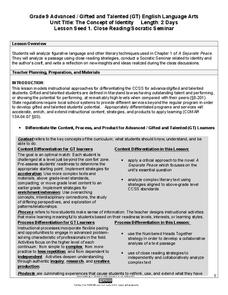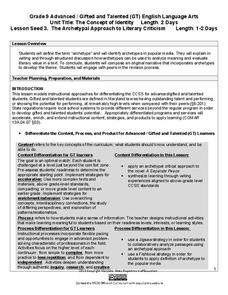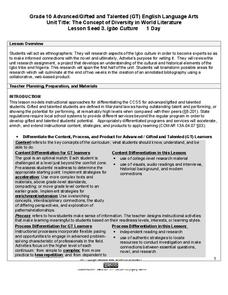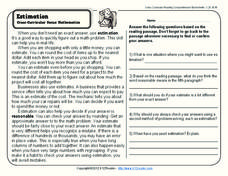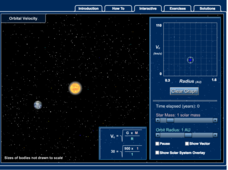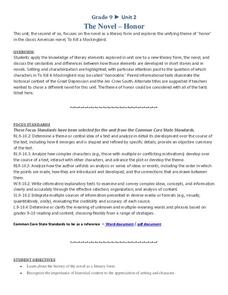Maryland Department of Education
The Concept of Identity Lesson 1: Close Reading/Socratic Seminar
John Knowles' A Separate Peace provides readers with an opportunity to develop their close reading and analytical skills as they look for what Knowles feels are the factors that shape our identity.
Maryland Department of Education
The Concept of Identity Lesson 3: The Archetypal Approach to Literary Criticism
As class members continue their study of approaches to literary criticism, readers examine the symbolism and archetypal patterns in John Knowles' A Separate Peace, and how these parallels are used to develop a theme in the story.
Maryland Department of Education
The Concept of Diversity in World Literature Lesson 10: Author's Purpose Seminar
Why did Chinua Achebe write "An Image of Africa: Racism in Conrad's Heart of Darkness" in response to Conrad's novel? As part of a study of Things Fall Apart, class members conduct a socratic seminar focused on Achebe's purpose and...
Maryland Department of Education
The Concept of Diversity in World Literature Lesson 3: Igbo Culture
What cultural concepts must readers understand in order to connect to Things Fall Apart? As part of their study of Chinua Achebe’s novel, class members research Nigeria and the Igbo culture to create a collaborative, web-based, annotated...
Philadelphia Museum of Art
Physics at the Art Museum: Kinetic Energy, Potential Energy, and Work
Connect science, math, and art for a true interdisciplinary lesson! Learners explore simple machines in art. Through analysis with a physics app, they identify positions of kinetic and potential energy and make conclusions about work.
Baylor College
Food for Kids
Immediately capture the attention of your class with the smell of freshly popped popcorn in the sixth activity of this series on the needs of living things. Young scientists first use their senses to make and record observations of...
New York City Department of Education
Colonial America and The American Revolution
How did the founding of the American colonies lead to a revolution? Use the essential question and sample activities to guide learners through a series of history lessons. Additionally, the packet includes effective strategies to...
Alliance Theater
The Jungle Book Post-Show STEAM Lesson
An ecosystem is really just the flow of energy through many different living organisms. A study of Rudyard Kipling's The Jungle Book leads to an environmental science activity in which learners study how various factors can affect...
Curated OER
Earth's Heavenly Treasures: Hummingbirds
Young ornithologists watch an informative video and use the Internet to gather data about the life, size, habitat, and migration of hummingbirds. The interdisciplinary lesson includes activities that target art, science, math, and...
Curated OER
Hypothetical Heights
High schoolers participate in an interdisciplinary lesson to discuss improvements that would make them want to return to a previously poor neighborhood. In this civics lesson, students work in a budget to make a plan to better their...
Curated OER
Form and Observation
Use a familiar song and adorable baby animal pictures to teach youngsters about genetic variation. Begin by listening to "Twelve Variations on 'Ah vous dirai-je Maman,'" which you will need to find online (there are several versions...
K12 Reader
Classifying Triangles
Bring math and reading informational text together with a reading comprehension lesson. After kids read about isosceles, scalene, and equilateral triangles, they answer five comprehension questions to demonstrate how they can use context...
K12 Reader
Estimation
When is it a good idea to use estimation? Learn about estimation and rounding with a reading comprehension lesson. After kids read a passage about estimation, they answer five comprehension questions on the other side of the page.
Baylor College
HIV/AIDS in the United States
In the final of five lessons about HIV/AIDS, groups create presentations to share data about the infection rates in the United States, examining demographic and geographic trends over the past ten years. Depending on how much time you...
NPR
This Isn't Right: A History of Women in Industry
Women were in the workplace long before Rosie the Riveter pushed up her sleeve. Learn about the working options available to women during the Industrial Revolution, the Progressive Era, and the Great Depression with a lesson that prompts...
McGraw Hill
Orbital Velocity Interactive
Why does it take Pluto 90,000 days to orbit the sun, but it only takes Mercury 88 days? An interactive lesson helps pupils find a connection between the speed of orbit and distance a planet is from the sun. The simulation allows for...
LABScI
Population Dynamics: The Predator-Prey Lab
Wolves eat better when the bunny population increases, but how long does that last? A series of 12 biology lessons uses the sixth installment to explore the predator-prey relationship between bunny and wolf populations. Young scientists...
West Jefferson High School
The Novel — Honor
For classes tackling To Kill a Mockingbird, this lesson plan sets readers up for discussions or essay writing with questions and prompts. The prompts encourage individuals to explore beyond the novel itself, looking at photographs from...
Scholastic
Hillary Conquers Everest
If a field trip to the summit of Mount Everest isn't in your school budget, make the trek virtually! An interactive lesson allows class members to follow Sir Edmund Hillary and Tenzing Norgay's trail up the mountain, and provides...
National Park Service
How Theodore Roosevelt Became a Leader: Childhood of an American President
The beginning of the 20th century began with a shock: the assassination of President McKinley. The man who would take his place—the youngest American to ever become president—led quite a life before stepping foot in the Oval Office. An...
Concord Consortium
Acid Test
This isn't your typical basic lesson—it's more acidic! Learners use pH information to determine the hydroxide ion concentration of different substances and then use these values to analyze information. The calculations require...
Longwood University
How Can We Help Maintain Our Water Supply? Conserving Water
Make young citizens aware of their environmental impact early. An inquiry-based lesson plan helps learners analyze their own water usage patterns and understand the effects of their habits. Individuals look at data to spot trends and see...
NASA
Code a Mars Sample Collection Video Game
Video game designer meets science in a lesson examining the science of space exploration. Young learners use online software to create a video game that mimics the process of sample collection on Mars. They must make appropriate...
Curated OER
Radioactive: An Interdisciplinary Study of Marie and Pierre Curie
Use this innovative text to show the far-reaching influence of the dynamic Curie couple


